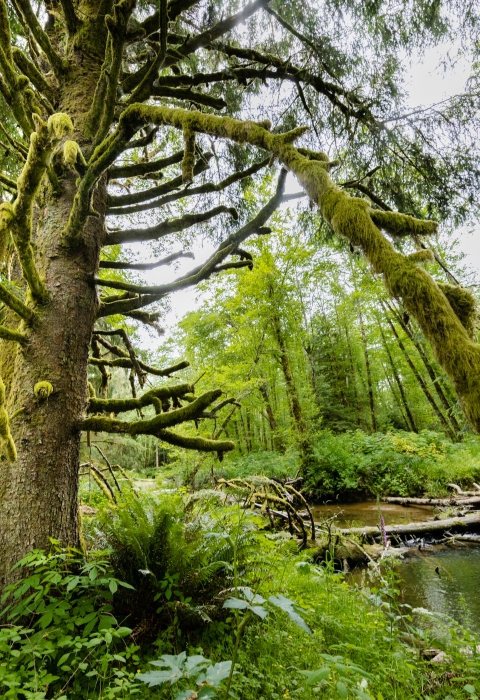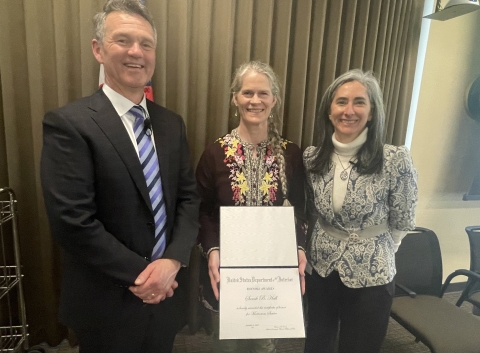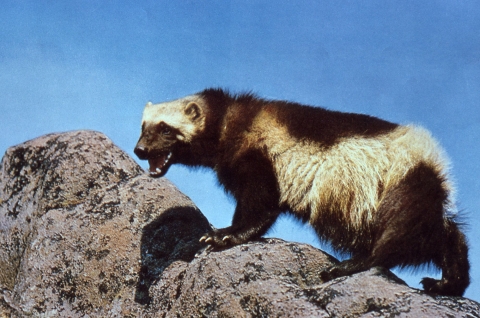Recently retired Pacific Region supervisory fish and wildlife biologist and regional recovery program coordinator Sarah Hall has received the Meritorious Service Award from the Department of the Interior. Hall’s outstanding leadership, dedication, and contributions to the Pacific Region Endangered Species Recovery Program for federally listed species in Idaho, Washington, Oregon, Hawaii, and the Pacific Islands have rightfully earned her this special distinction given only once in a person’s career.
Based in Portland, Oregon, Hall’s career in conservation with the U.S. Fish and Wildlife Service began more than 25 years ago and is rooted in a deep love of nature and a passion for partners and colleagues working together to recover endangered species. “I've always been drawn to nature and knew at a young age that I wanted to work with and help conserve species; I spent a lot of time outdoors growing up and was inspired by the work done by pioneering individuals like Dian Fossey, Jane Goodall, and Alan Rabinowitz,” says Hall.
An exemplar of a career come full circle, Hall studied wolverines in graduate school through Portland State University and later went on to play a role in the team that led to the Service’s listing of wolverine as threatened under the Endangered Species Act just a month before she retired. Shortly after Hall’s tenure began, she formed and led a dynamic regional team responsible for the monumental job of creating recovery plans, issuing recovery permits, overseeing the grants to States program, overseeing recovery implementation, and conducting status reviews for the 621 species in the Pacific Region protected by the Endangered Species Act.
For Hall, teamwork truly makes the dream work. She considered her career a “dream job” with the most rewarding days involving “being part of a team of very talented people that got to focus on efforts to conserve and recover imperiled species and their habitats.” From the people she has trained to the projects she worked on, her colleagues attest to her ability to make complicated processes engaging and efficient. Hall taught countless Service biologists the ins and outs of recovery planning and five-year status reviews.
Hall parlayed her penchant for working with others into several leadership positions. She streamlined many recovery-related processes for the Pacific Region and served as an esteemed coach for the Service’s Stepping Up to Leadership program. She was also an early leader for the Service on climate science at a time when the effects were not well understood, maintaining the region’s initial Climate Science Database for best available science on climate change climate change
Climate change includes both global warming driven by human-induced emissions of greenhouse gases and the resulting large-scale shifts in weather patterns. Though there have been previous periods of climatic change, since the mid-20th century humans have had an unprecedented impact on Earth's climate system and caused change on a global scale.
Learn more about climate change . In addition to leading the Pacific Region’s approach to climate science, Hall was the driving force behind region-wide recovery workshops that most recently culminated in a Pacific Region Recovery Training Workshop. Ever the supporter of recognition for employees who make a difference, she spearheaded the Pacific Region’s Recovery Champion Awards, designed to recognize employees and partners beyond the national Recovery Champion Awards.
Hall’s care and support of her colleagues was also evident in her almost continuous volunteering and participation on the region’s Safety Team. Hall’s focus has always been on valuing the sound scientific work of, and maintaining a safe workplace for, Pacific Region employees. "Sarah has been a remarkable conservationist, mentor, and colleague. Her legacy is evident in every recovered species and in each biologist she's hired, mentored, and coached over the years. I feel lucky to have worked with her," says Kate Norman, assistant regional director for the Service’s Ecological Services program in the Pacific Region.
Hall is humble when it comes to the legacy she left and thinks less of her own mark on the agency and more about the future of the Service as a force for good for future generations. “I've appreciated the efforts the Service has made to reach out to diverse communities; each of us has unique perspectives and talents such that, when brought together, we can accomplish so much more,” says Hall. “It will take that diversity of knowledge, experience, and creativity to continue to adapt the work that needs to be done to conserve species in this ever-changing environment.” Conservation is an ethos that obviously plays a role in everything Hall does, transcending her professional life into her personal life. While she doesn’t have any specific plans at this point in her retirement, she says she is “enjoying the transition to spring and taking time to get back outside and reacquainted with our garden and local wild areas.”





